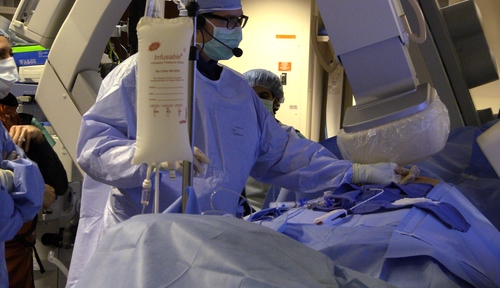Marc Leger lived under the constant threat of having a stroke. He has atrial fibrillation, an irregular heartbeat.
Because of another medical condition, the 62-year-old Plattsmouth, Neb., man cannot take blood thinners, which is how doctors typically deal with the stroke risk present with atrial fibrillation patients.
Previously, the only way to deal with the risk involved open heart surgery to close off the left atrial appendage, a small part of the heart where blood can pool and clots can form.
“With atrial fibrillation, blood doesn’t go in and out very well,” explains cardiologist John Scherschel, M.D. “The clots form in those nooks and crannies and can be carried out.”
Dr. Scherschel is the first physician in the region to bring a new alternative to surgery for patients like Leger. It’s called “Lariat” and involves a small incision and a needle stick, performed in a cardiac catheterization lab with the patient under general anesthetic.
“When I saw this technique described in scientific literature back in 2009, I said, ‘We need to be doing that,'” Dr. Scherschel said.
See video on the Lariat procedure
Leger’s procedure began by placing a needle and then a small tube into the pericardium, the space around the heart. Then a catheter was placed in a vein in his leg. Guided by X-ray and ultrasound, Dr. Scherschel ran the catheter into Leger’s heart and into his left atrial appendage. The catheter is tipped with a small magnet which attached to another magnet on the probe on the outside of the heart.
“That creates a rail over which the Lariat loop can pass,” Dr. Scherschel explains. “We place that loop over the neck of the appendage and close the loop.”
Ultrasound is used to ensure no more blood is flowing into the appendage. The stitch closing the appendage is then cut, and the tiny instruments removed. The process typically takes less than an hour.
Dr. Scherschel said the biggest benefit of the Lariat procedure is the ability to provide the same outcome as open surgery without the lengthy hospital stay and risks of complication. “It really is an elegant solution,” Dr. Scherschel says.
The Nebraska Medical Center is one of a small number of hospitals in the U.S. and the only hospital in the region performing Lariat procedures. “This is proof the medical center is committed to bringing new cutting edge procedures here for the benefit of our patients,” says Jorge Parodi, executive director of Cardiovascular Services.
